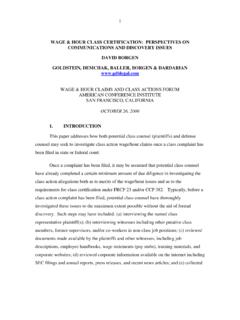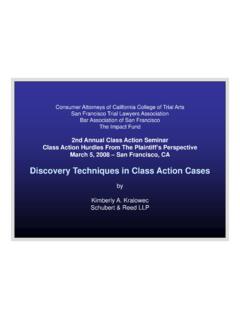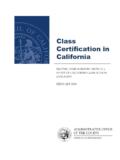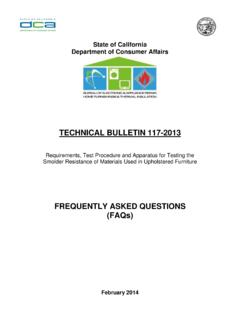Transcription of Stay Current Bifurcated Discovery in Class Actions An ...
1 Y 1 1 Bifurcated Discovery in Class Actions : An Effective Strategy to Prevent the Continuation of the Unmeritorious Lawsuit BY THE COMPLEX LITIGATION AND TRIAL PRACTICE Consumer Class action lawsuits are expensive. Case after case confirms this fact. Recognizing this, many consumer Class action lawsuits are filed without a proper Class representative, solely so that Discovery may be initiated to locate a plaintiff with a legitimate claim.
2 As counsel for the named plaintiffs search for someone, anyone, to step into the lawsuit in the place of the original plaintiffs, the defendant faces substantial cost in Discovery alone, and that cost takes many forms. It includes dollars spent, employee hours lost, possible reputational harm in the market place, and a general distraction from day-to-day operations. In light of that reality, the Paul Hastings Complex Litigation and Trial Practice employs a number of strategies in an effort to reduce that cost. One of those strategies is to pursue Bifurcated Discovery .
3 Assuming a case survives a demurrer or a motion to dismiss, and after consultation with the client to ensure the strategy is appropriate for the particular case, Paul Hastings will often seek to bifurcate Discovery into two phases: (1) pre- Class certification Discovery , and (2) post- Class certification Discovery . In the pre- Class certification phase, Discovery would be limited to the issues relevant to the Class -certification analysis, inclusive of the plaintiff s standing to pursue the asserted claims. If a Class is certified and makes it to the post- Class certification phase, Discovery will focus on the merits of the underlying claims.
4 Where a court agrees to bifurcate Discovery , the costs of pursuing merits Discovery can be delayed or eliminated. This alert discusses the reasoning behind and the practical implications of pursuing a Bifurcated Discovery plan in consumer Class action cases, and how that strategy can adroitly be used to block the claims of improper Class representative plaintiffs in their entirety. Background Limiting Discovery to Class -related issues until such time as Class certification is decided is permitted under various state and federal laws, including the california Code of Civil Procedure and Rule 26(c) of the Federal Rules of Civil Procedure.
5 In cases pending in federal court, Bifurcated Discovery also helps to expedite the decision on Class certification in accord with Federal Rule of Civil Procedure 23(c)(1), which requires that Class determination be made as soon as practicable. This makes sense, as the underlying merits questions the basis of the representation in a false-advertising case; the thinking behind a business strategy in an unfair competition case are often irrelevant to the Class -certification analysis and only add to the cost of defending a case destined for certification denial. June 2011 2 2 Several cases provide support for limiting Discovery in putative Class Actions .
6 In Linder v. Thrifty Oil Co., 23 Cal. 4th 429, 440-41 (2000), for example, the california Supreme Court noted that a Class certification motion is appropriate before the parties engage in substantial Discovery . A few years later, in Lockheed Martin Corp. v. Superior Court (Carrillo), 29 Cal. 4th 1096, 1125 (2003), the Court held that certification of a Class action may not be conditioned upon a showing that Class claims for relief are likely to prevail (citing Linder, 23 Cal. 4th at 443). In Sav-On Drug Stores, Inc. v. Superior Court (Rocher), 34 Cal. 4th 319, 326 (2004), the california Supreme Court noted that the central issue in a Class certification motion is whether the questions that will arise in the action are common or individual, not the plaintiffs likelihood of success on the merits of their claims.
7 Thus, a defendant seeking to bifurcate Discovery can argue that a plaintiff does not need to obtain merits information such as the defendant s companywide procedures or accounting practices to ascertain who constitutes a potential Class member. Practical Implications In cases where a plaintiff is unlikely to satisfy the requirements for Class certification, limiting Discovery to Class -related issues may help move the case toward final resolution sooner than if a plaintiff were allowed to pursue merits-based Discovery prior to a Class certification hearing. In addition, bifurcating Discovery will limit the amount of information a defendant needs to disclose early on in the case.
8 This is extremely valuable in cases where a plaintiff demands that a defendant provide Class member contact information. Plaintiffs often seek this information immediately upon filing suit, to secure a backup Class representative should the named plaintiff Defendants are often very reluctant to provide this information, both for privacy and business reasons. california law regarding the ability of a putative Class action plaintiff to force a defendant to identify the names and contact information of potential Class members has been fractured, therefore, bifurcating Discovery may help to avoid having to produce this If, for instance, earlier focus can be placed on the plaintiff s standing (or lack thereof), a defendant may improve its chances of not having to produce Class member contact information.
9 The california Court of Appeal recently addressed the issue of Class member contact information in Starbucks Corp. v. Superior Court (Lords), 194 Cal. App. 4th 820 (2011). In Starbucks, the Court dismissed the plaintiff s Discovery request for job applicants contact information, holding that the privacy concerns of putative Class members vastly outweighed any benefits of disclosing their identities. Putative Class members in Starbucks were former job applicants with marijuana convictions more than two years old, which by california law were removed from public record.
10 Importantly for defendants, the Court recognized that [p]recertification Class Discovery is not a matter of right. Class Actions rest on considerations of equity and justice. Before allowing Class counsel to find a viable Class representative, trial courts must apply a balancing test and weigh the actual or potential abuse of the Class action procedure against the potential benefits that might be gained. 3 Starbucks was right in recognizing that recent law has called for application of a balancing test in determining whether to allow Discovery of absent Class members contact information.











